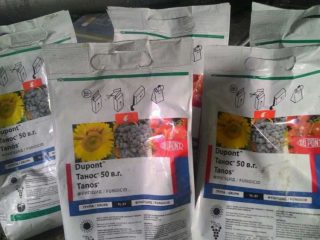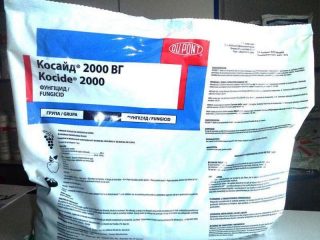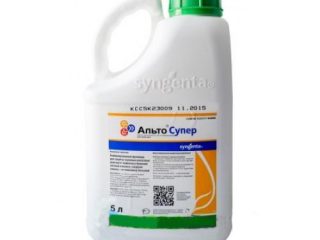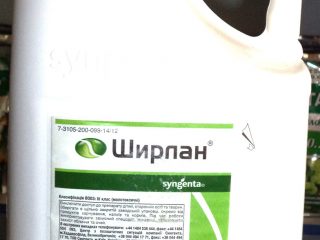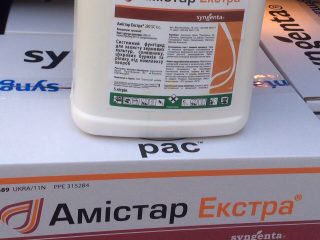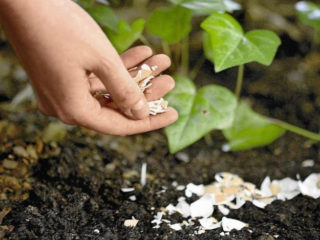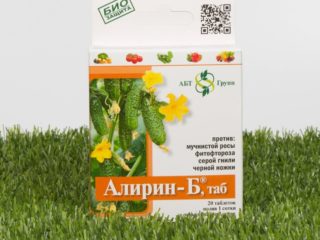Content
Instructions for use of Glyokladin for plants apply to all crops. The drug is widely known among gardeners and is one of the best helpers in the fight against various diseases found in the garden. It helps to cope with ailments of fruit, berry, vegetable crops, as well as flowers and ornamental shrubs. At the same time, it does not damage plants, the environment, does not harm birds, animals and insects, and does not harm human health.
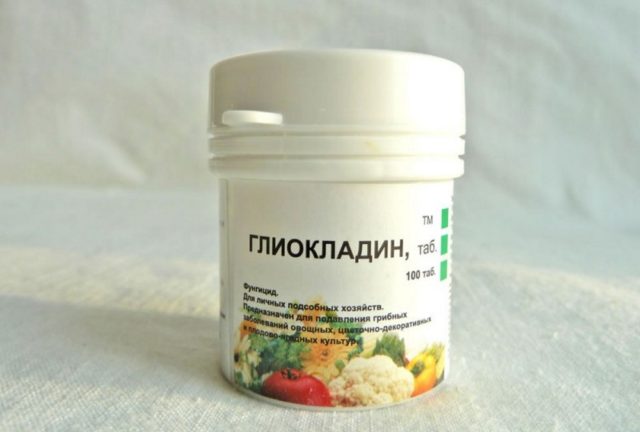
The product is used before sowing and planting seedlings
Description of the drug Glyocladin
“Glyokladin” is a microbiological preparation that suppresses the development of fungal and bacterial diseases on plant crops. Belongs to the class of fungicides and biological pesticides. “Glyokladin” and its use in garden plots have long been widely popular. It is applied to seedlings of fruit trees, berry bushes, flowers and vegetables. Summer residents fell in love with it for its simple use and proven effectiveness.
Composition of the drug Glyokladin
Glyokladin tablets are of biological origin. Their main component is the fungal culture Trichoderma harzianum. Under favorable conditions, its mycelium begins to actively grow, and the emerging fungus exerts protective effects on plants through its vital activity, without entering into symbiosis with their roots.
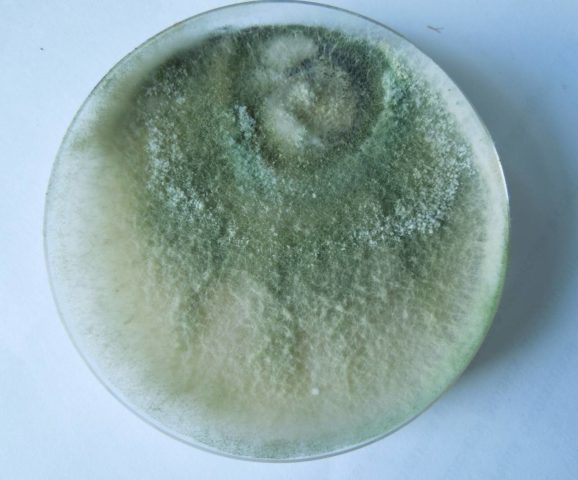
The active ingredient of the biocomplex “Gliokladin” is the mushroom – Trichoderma
Release forms
"Gliocladin" is manufactured by a Russian manufacturer, the company "AgroBioTechnology".
There are several forms of its release:
- Pills. They go on sale in plastic jars and cardboard packages for vegetables and flowers, 1000 and 100 pieces.
- Wettable powder. Can be found in 60 g jars.
- Suspension. Ready concentrate in five-liter canisters.
Purpose and principle of operation
The main purpose of the highly effective soil biofungicide "Glyokladin" is the disinfection of soil from various fungal infections and their pathogens. First of all, the use of the substance is aimed at protecting against root and basal rot of flower, cucumber and tomato crops.
“Glyokladin” is most often applied to the soil at the growing stage, at the time of transplanting seedlings, as well as into closed soil: in greenhouses, hotbeds, greenhouses.
The basis of the complex, which triggers the mechanism of action, is the antagonist Trichoderma fungus. After entering the soil, it begins to create a powerful mycelium, using the mycelium of parasites. Thus, the growth of pathogenic microorganisms is suppressed and destroyed. In addition, the fungus secretes antibiotics that block the development of many diseases.
The substance is used not only for medicinal purposes, but also for disinfection of soil mixtures when picking seedlings and planting them in a permanent place.
“Glyocladin” breaks down organic matter, releases carbon, enriches the soil, and also accelerates plant growth, increases their immunity and resistance to many diseases.
Application area
The drug is very famous. It is used as a preventive measure and for the treatment of fungal diseases on indoor and garden plants, fruit trees and flowers. Typically used against root rot and infections in the soil:
- late blight;
- pythiosis;
- Alternaria;
- fusarium;
- verticillium;
- rhizoctoniosis.
The tablets have proven themselves in the fight against powdery mildew, mold and purple spot.
Consumption rates
The instructions for “Glyokladin” say that in each case of use of the product it is recommended to individually calculate the consumption of the substance.
Gardeners should proceed according to the following scheme:
- Take 1 tablet of the drug per 300 ml of soil.
- A pot with a diameter of up to 17 cm requires 3 pills, and a pot with a diameter of 20 cm or more requires 4.
- When planting vegetable crops, it is recommended to apply 3-4 tablets per hole.
- When picking and sowing seeds of flowers, cucumbers and tomatoes, you need to plant 1 piece in the soil. “Glyokladina” to a depth of at least 1 cm.
To prepare the liquid form, you need to add approximately 50 g of the product to 500 ml of water. The suspension should be poured into the irrigation tank and used up within two hours.
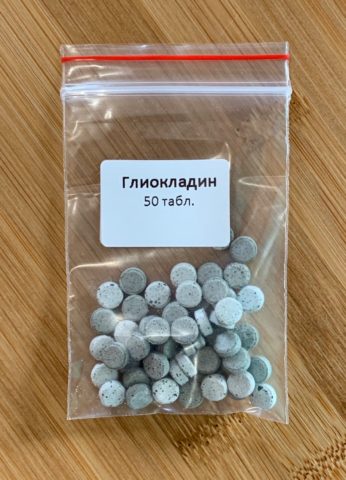
The tablets should be buried in the ground; they do not dissolve in water.
Instructions for use of the drug Glyocladin
When using Glyokladina tablets, they are placed in the ground to a depth of one to one and a half centimeters, in dry form, once a season. One piece is enough for 1 plant, hole or 300-800 ml of soil.
When using a suspension or powder, the product is diluted in water according to the instructions presented on the package. The liquid preparation is usually used in the spring and a week after steaming the soil in the greenhouse. Treatment can be done by spraying or watering. After the procedure, the area is dug up so that the fungal spores are distributed evenly over the ground. The dosage of liquid “Glyokladin” is as follows: 1-2 buckets of working solution per 100 m of land or 60-150 ml of suspension per 1 ha.
The drug retains its effects in the top layer of soil. Ideal conditions for it: planting depth up to 8 cm, humidity from 60 to 80%, temperature +20-25 degrees Celsius, acidity 4.5-6. Deviation from the norm will slow down the growth of mushroom mycelium and reduce the effect.
How to use Glyokladin for seedlings
To get healthy seedlings, Glyokladina tablets are introduced into the ground at the stage of picking the sprouts into temporary boxes. You need to put half a tablet on one well. When planting grown seedlings in the ground, the calculation is as follows: 1 tablet per 1 hole. The actions are especially relevant when growing cucumbers and tomatoes.
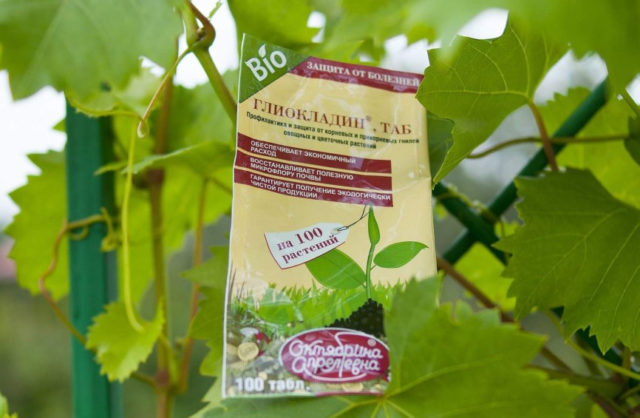
The drug is not used for spraying plants
For vegetable crops
From the instructions for using “Glyokladin” for plants and, judging by the reviews of gardeners, it is clear that the effect of using the biosubstance will be achieved only if it is used correctly:
- When sowing seeds, tablets should be added to the soil, watered well and the containers with planting material should be left warm under the film.
- To prevent diseases, apply once (1 piece - 1 plant).
- For treatment, use 2 tablets per plant.
- When planting potatoes, add 2 pills per 1 tuber.
How to use Glyokladin for flowers and ornamental shrubs
Judging by the instructions for use and reviews, Glyokladina tablets have a beneficial effect on the growth of ornamental shrubs and garden flowers. After using them, the buds become stronger and larger, and bloom longer. Use the drug according to the same scheme as for vegetables (1 plant - 1 tablet). In warm weather, the product retains its beneficial effects for 1-2 months.
For indoor flowers and plants
The drug "Glyokladin" for indoor plants is usually used when replanting them. Place one tablet in small pots, three in containers with a diameter of more than 17 cm, it is advisable to place 4 in large pots. First, soil is poured into the container, “Glyokladin” is placed in the center, a flower is planted and covered with soil.
If the pills did not help, it means that the treatment was carried out too late, and in order to overcome the disease, stronger remedies will be required.
For fruit and berry crops
Fungicide is rarely used for fruit trees and large berry bushes, and it only helps to prevent diseases. In case of infection, its effect becomes ineffective. It is preferable to use “Glyokladin” for small plants: wild strawberries, strawberries, preferably in liquid form. The bushes need to be sprayed during the flowering and ripening phases of the berries.
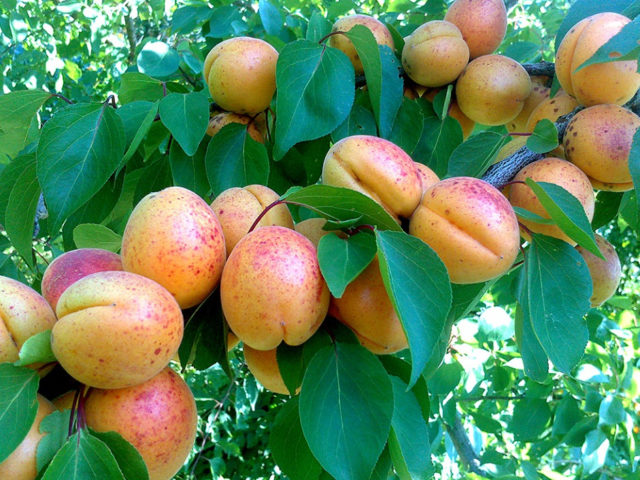
The liquid solution of Glyokladin should be used no later than 4 hours after preparation.
How to treat raspberries with Glyocladin for purple spotting
Although the instructions for use of the drug Glyokladin for plants do not say anything about the treatment of purple spot (a fungal disease), gardeners advise using it for this disease on raspberries. The first treatment should be carried out in the spring, before the buds open. The second (by spraying) - at the time of flowering.
How to use Glyocladin tablets for cuttings
The drug in tablet form can be used for root cuttings, rooting blackberries, raspberries and rose hips (1 cutting – 1 tablet).
To strengthen green cuttings (roses, sea buckthorn, lilacs, indoor flowers) use a substance in suspension, which is added to water. The solution is stored at a temperature of +5 °C, no more than a month. Allow it to warm up before use.
Advantages and disadvantages
The fungicide "Glyokladin" (see photo) has a number of advantages, these include:
- Easy to use.
- One-time processing.
- Safety for people, animals, fish and birds.
- Non-toxic.
- Effective in combating pathogens of many diseases.
- Long validity period.
- Ability to increase yield.
- Improving soil health and improving its microflora.
- Eliminates the need to use chemical pesticides.
- Growth-stimulating effect.
Among the shortcomings of the drug, one can note only the fact that it is often counterfeited. By purchasing a low-quality product, there is a possibility of either harming the garden or not seeing results.
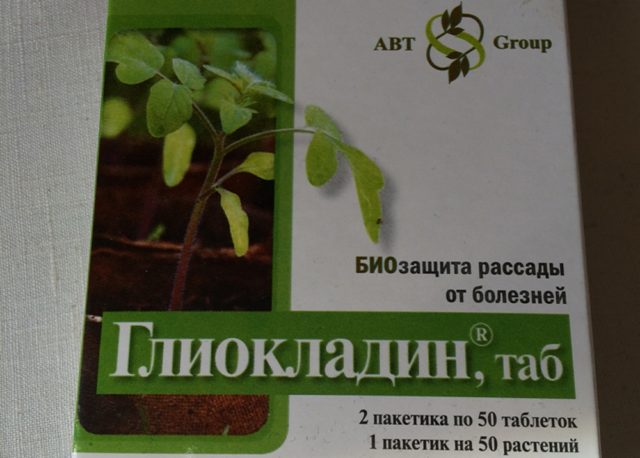
When buying a drug, it is important to beware of counterfeits
Compatibility with other drugs
"Glyokladin" can be combined with any other biofungicides, insecticides, fertilizers, growth regulators and chemical herbicides. To increase efficiency, it can be used in combination with the drug “Planriz”, “Gamair”, “Alirin”.
A limitation is considered to be simultaneous use with chemical fungicides, as well as with other pesticides, with the exception of analogues containing Trichoderma strains.
Security measures
Tablets for plants "Glyokladin" have a hazard class of 4, are harmless to human health and practically non-toxic to plants, and can be used in areas of water bodies.
If a person accidentally swallows a pill of the drug, to prevent unpleasant consequences it is necessary to perform a gastric lavage and consult a doctor. It is better to work with the substance with gloves.
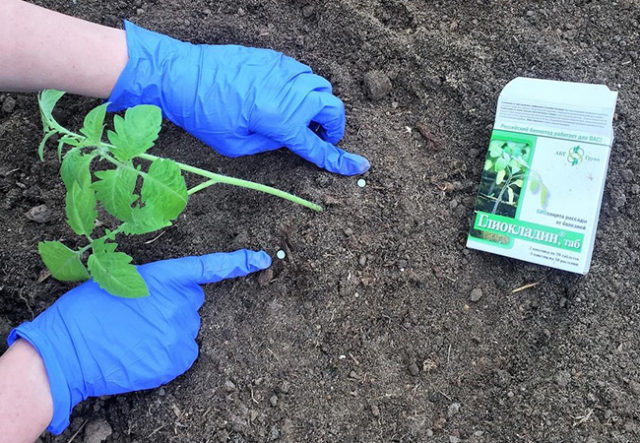
The validity period of "Glyokladin" is 2 months after application
Storage rules
Biocomplex "Glyokladin" should be stored in a cool, dry room, at a temperature of +6-14 °C, away from medicines and food. The place must be inaccessible to children and animals.
In closed packaging, Glyokladin can be stored for two years.
Analogues of Glyokladin
The drug can be replaced with drugs similar in mechanism of action, they are:
- Trichocin.
- Trichodermin.
- Trichosan.
- Trichoflor.
- Alirin-B.
- Gamair.
- Baktofit.
Before using each drug, it is important to carefully read the instructions. Make sure that after their use the desired effect and benefit will be achieved in full.
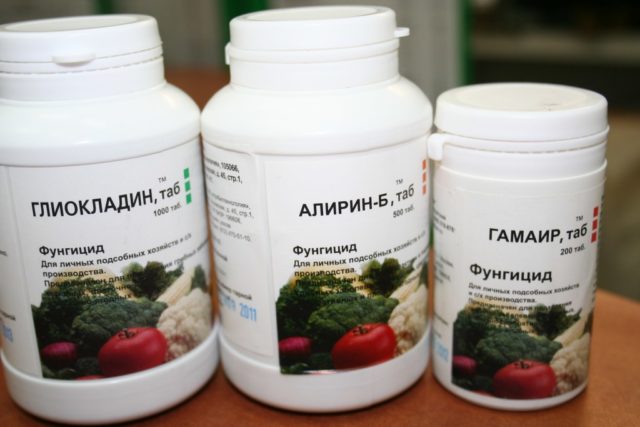
To prevent root rot, use 1 tablet to a depth of at least 1 cm
Conclusion
Instructions for use of Glyokladin for plants informs that the product can prevent diseases of house and garden plants without having a detrimental effect on them. Judging by the numerous reviews of the drug, gardeners have learned from their own experience of its effectiveness and annually try to use the biological fungicide in their own garden plots. The popularity of tablets is growing from year to year.

